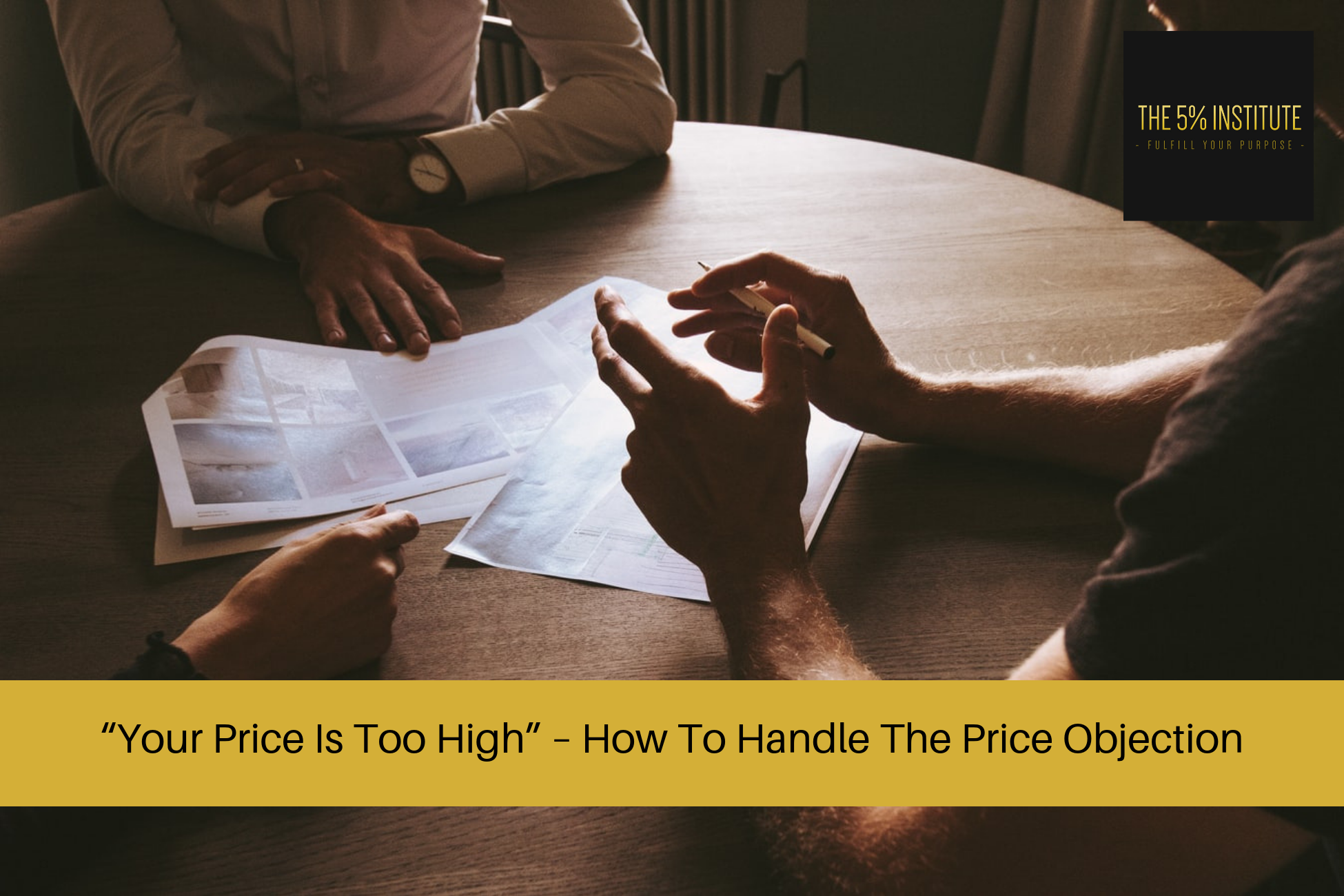
“Your Price Is Too High” – How To Handle The Price Objection
One of the common objections Sales Professionals and Business Owners regularly face, is the comment “Your price is too high” – also known as the price objection.
In this article, we’ll look at where the price objection comes from, when you should start talking about price and money; and how to handle the price objection.
“Your Price Is Too High” – How To Handle The Price Objection
Where The Price Objection Comes From
Prior to learning about how to handle the price objection, it’s important to know where it comes from in the first place.
Generally, the price objection comes from three places:
Prospect Type:
A common mistake Salespeople make, is trying to sell to an audience who can’t afford their product or service.
Sure; if someone wants something enough and has the ability to take a loan out, they’ll buy your product or service.
However, are the people you’re talking to really able to afford your product or service; or is your sales targeting strategy off?
Prior to meeting with potential clients, find out who your ideal client is, who can in fact afford your product or service, and put your prospecting efforts towards those people.
This is your first step towards preventing the “Your price is too high” comment and price objection.
Value:
The second reason the price objection comes up, is because you haven’t demonstrated the value behind what it will mean when they own your product.
If you stay on the surface and talk about features and benefits, they’ll naturally start comparing your product or service to your competitors.
If you go deeper and get on an emotional level with your prospects; understanding their pain and desires – you’ll have a better chance of understanding the value of what it is they’re looking for and position yourself as a specialist.
Premature Presentation:
As per our article in Entrepreneur Magazine, many Salespeople and Business Owners try to sell much too soon, without understanding what is in fact the prospect is trying to address and gain from buying.
When you present too soon, you position yourself as a commodity and order taker, rather than a person who truly cares and wants to help your potential client’s needs.
If you present too soon, you’ll be telling the prospect that you are a commodity – meaning that you can be compared to on price.
Presenting too soon is a common reason for why people bring up the price objection.
Learn more: How To Stop Winging It, And Learn Exactly How To Close Consistent Sales With Ease
When To Bring Up Price
In The 5% Sales Blueprint, we teach Sales Professionals and Business Owners that they should bring up price in the middle of their sales process, rather than wait until the end.
We also teach not to bring it up too early; as you wouldn’t have been able to demonstrate enough value yet at this point.
When bringing up money, you should be exploring two things:
- Firstly, what is their current pain point/ problem costing them? What does it cost not to have this solved?
- Secondly; learn what they are willing to pay to have this rectified?
What’s happened now, is that we’ve re framed the sales conversation and potential price objection.
Instead of your prospect comparing your product or service to your competitors, they’re comparing your solution to what it’s costing them by not taking action.
How To Handle The Price Objection
As we’ve covered where the price objection comes from, as well as when to bring up money in your sales process; let’s now explore how to handle the price objection.
You’ll read many responses online about how people handle this, however you want to respond without sounding scripted; and don’t want to break rapport with your prospect that you’ve already worked so hard with to get to this point.
The three best ways to handle the price objection are:
Let them know that you understand their concern, and then ask them politely compared to what?
This allows them to bring up any comparisons they may have made with you and your competitors and gives you the opportunity to differentiate yourself.
Ideally as mentioned in this article; try to focus more on what it is costing them by not taking action, and what they will pay to have that resolved. This prevents this issue generally from coming up.
Rephrase back whether it’s a cash flow issue, or an issue with their budget?
This gives the potential client an opportunity to further expand on their area of concern; and clarifies whether it is in fact a price objection, or something else.
Once you understand what the issue is, you can work with your prospect to explore how you can solve the finance issue.
Rephrase back their initial concern.
The best way to execute handling the price objection, is giving the objection back to your prospect.
Earlier the article mentioned getting them to speak about what it’s costing them not to have the problem solved.
If they say “Your price is too high”, and bring up the price objection, it gives you the opportunity to discuss their previous concerns about how not having this solved is costing them, and then contrast how your product or service is a better, more cost effective investment than not taking any action at all.
Final Thoughts
If you have gotten value from this article titled “Your Price Is Too High” – How To Handle The Price Objection, you will also get great value from our 7 day sales challenge.
Register by clicking the link here.
Want To Close Sales Easier?
Are you committed to closing sales a lot easier, and consistently?
If so, you should check out our self-paced and affordable online sales training program; The 5% Sales Blueprint.
It’ll give you everything you need to close sales consistently.
To learn more, simply click on the link below for more information.
Our Online Sales Training Program – The 5% Sales Blueprint.



